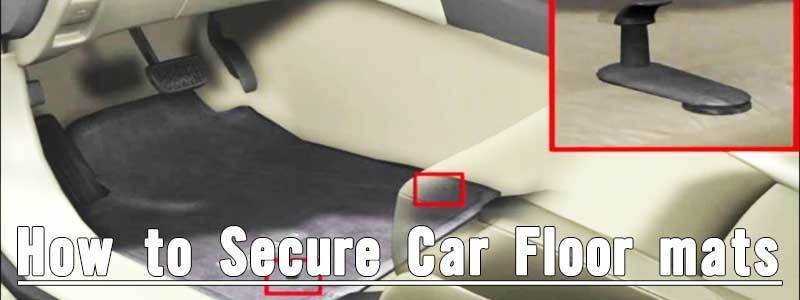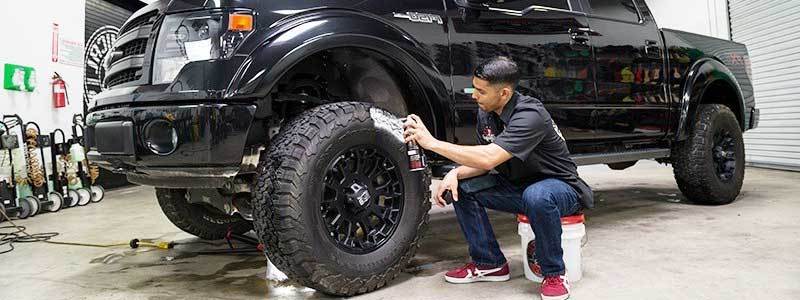“Learn from the mistakes of others. You can’t live long enough to make them all yourself.” – Eleanor Roosevelt
It’s true. None of us born as master detailers. People tend to do errors every now and then. But it’s the response to the error that counts.
Detailing a car is an art. And you won’t learn it in a day. It requires days of making mistakes and learning from them.
But sometimes mistakes are costly, especially when it involves your vehicle. One cannot allow to make every mistake and learn from it.
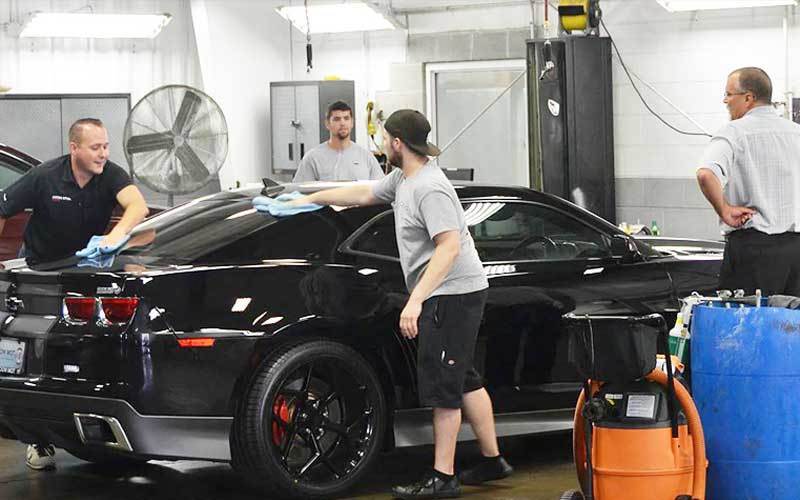
Car detailing
Here’s where this guide comes into play. In this article, we’ll discuss the top 15 mistakes made by beginner detailers. Hopefully, this guide will save you a costly, fancy detailing course and steer you away from the common mistakes.
Common Car Detailing Mistakes
1. Washing Under Direct Sunlight
It’s probably the most occurred mistake. People who make it often argue that it’s easier to see dirt and debris under the dazzling sun.
Well, that’s true. But the car quickly gets heated under the sun, and the suds you are using to wash the car start drying. And that is my friend, a laborious mistake.
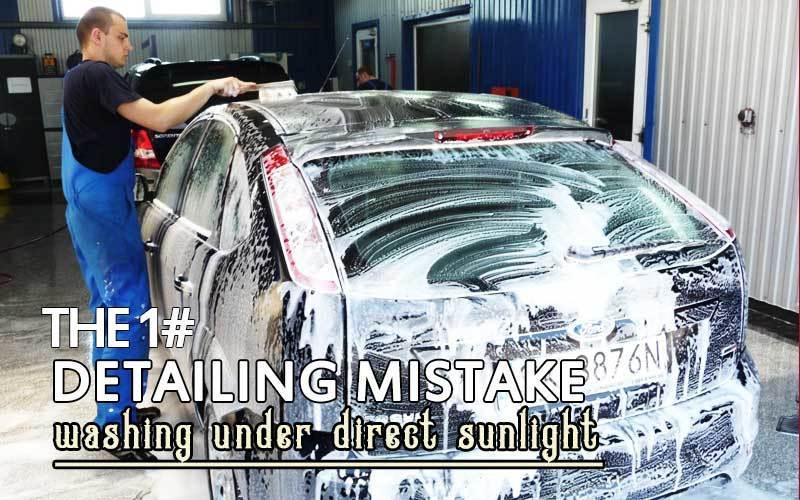
washing under direct sunlight
The dried soap leaves water marks and stains on the car exterior which is difficult to remove. You might even see ‘hologram like’ swirl marks on the paint after washing.
Do it under the shadow. If you must wash the car under sunlight, make sure to keep the car body cool by spraying water at regular intervals.
2. Cleaning Your Wheels And Tires Last
Most of us have been taught to clean the vehicle from up to bottom.
That’s okay unless it includes the wheels and tires. Often, they are the parts that frequently come in touch with the road. As a natural outcome, they are usually the dirtiest parts.
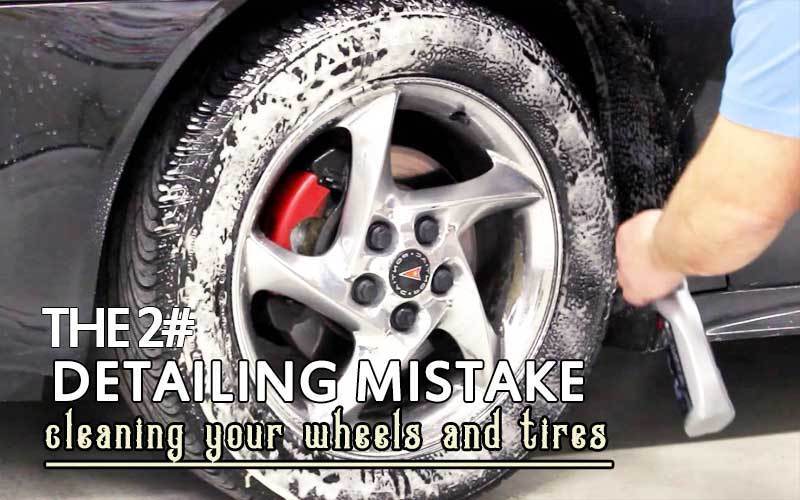
Cleaning Your Wheels And Tires
So, what happens here is you start to clean them last, and the dirt starts sprinkling over the car body. Often, you will find splashes of darts all over the surface.
Clean them first, then start washing your car from the top. This way you can avoid double washing your vehicle.
3. Using Dish Soap Or Detergent
The reason why people use dish soap is they clean oil and stain from kitchen utensils, so they can do the same job for cars.
Some might say, what’s wrong with replacing car washing shampoos with regular dish soaps or detergents? After all, all make amazing soapsuds, right?
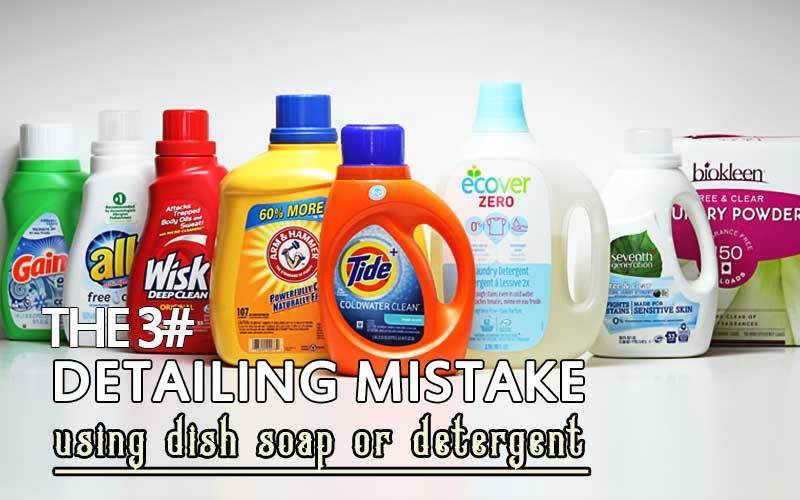
Using Dish Soap Or Detergent
Wrong! You see, the way we clean our plates and the car body isn’t the same. While we want to clean every oily grease from a plate, for car body we rather use wax.
Remember, dishwashing soaps contain acidic components on them. That’s what makes them so efficient in cleaning oily remains. If you use this in your car, the paint will lose its glossiness in the long run. Always use dedicated car shampoos.
3. Inadequate Lighting
The principle is simple, you can’t remove what you can’t see. Usually, the garage is the place we use to wash our car. The lighting is often so inadequate that we miss stains and dirt.
Also, it’s hard to do polishing and gauge varnish damage. The moment you pull your car outside, you’ll be in for a surprise!
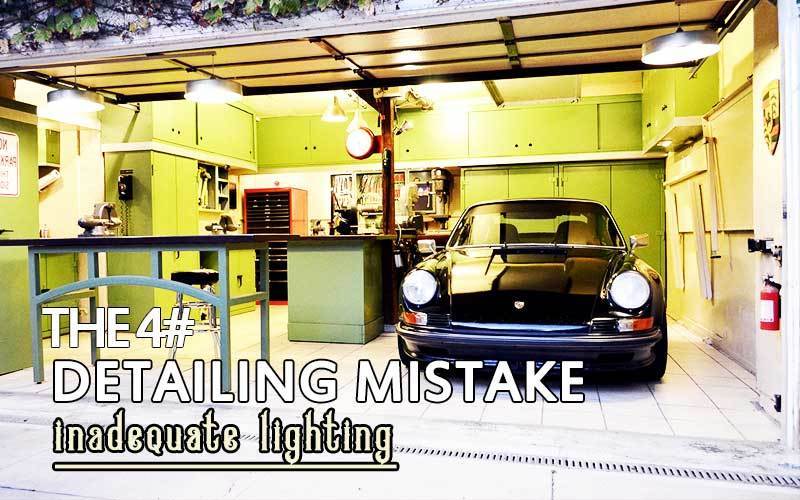
Inadequate Lighting
That’s why make sure you arrange enough lighting. You can wash the car outside. As for garage washing, mount fluorescent lamps vertically on your wall. Also, use hand lamps to double check your work at the late stage of cleaning.
5. Unrealistic Expectations
While you’re cleaning your vehicle, being in the right mind is important. Sometimes, we get so excited about the cleaning that we start cherishing unrealistic expectations.
That’s what will disappoint you and steer you to extreme measures. Sometimes vehicles are beyond repair. There might be a scratch too deep for a paint to cover, a years-old salt stain, an exterior with decaying paint.

Unrealistic Expectations
While cleaning the area fairly might be possible, a 100% restoration isn’t always an option. Some people fail to get the message and spend hundreds on harmful chemicals. This way, they end up worsening the situation.
Be realistic, sometimes being happy with improving the current condition and not seeking perfection is what’s good for your vehicle.
6. Using Too Much Wax
Many people think using layers after layers of wax is better. After all, the better quantity will drive to better output, they think. But for waxing, the opposite is true.
When you wax your car, only a thin layer is enough. That’s because wax works singularly, which means the layer in touch with the surface is actually working. No matter how much you apply, you’re only increasing the layers.
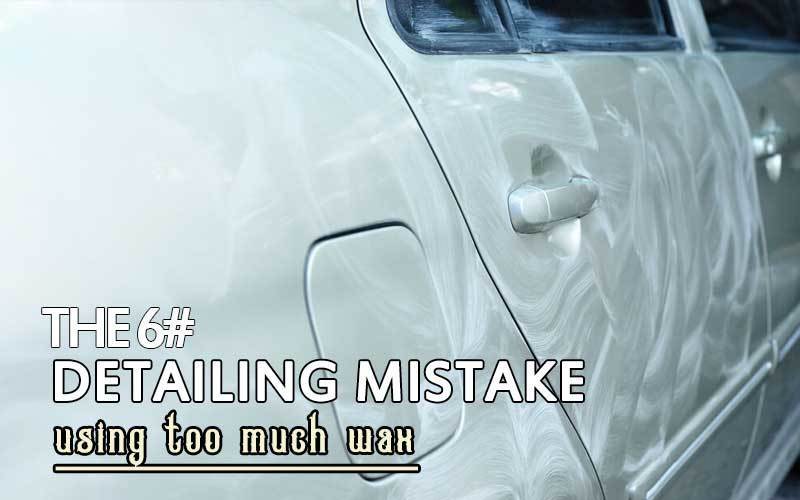
Using Too Much Wax
When you remove wax, you’re actually removing the upper layers of the wax that hasn’t bonded with the surface. So, all the additional applying means you are wasting the excess amount, time and money. Usually, applying one coat for foundation and second coat for possible missed areas is enough.
7. Not Using Microfiber Towels
Many beginners think of putting their old regular towels or t-shirts into use. There’s no doubt it’s a cheap solution, but it isn’t a suitable one.
Using a t-shirt or any other cloth can cause scratches on your car paint. That’s because these clothes are not soft enough and meant to ‘absorb’ sand particles. Rather, they scratch them against the paint, causing damages.
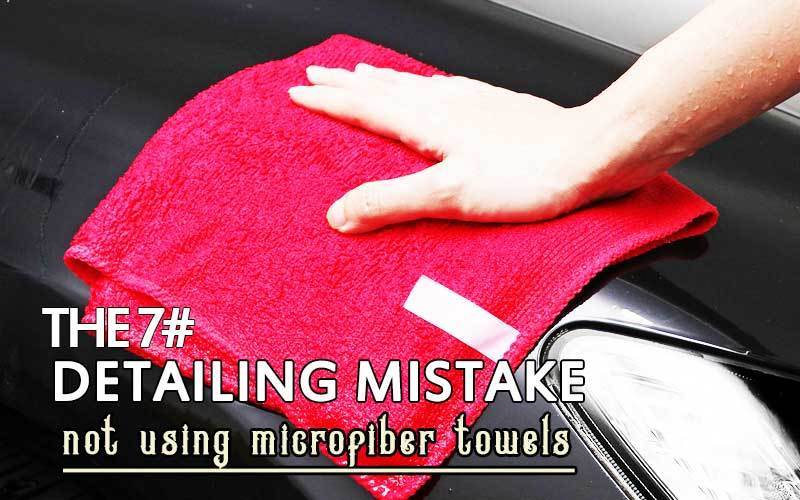
Not Using Microfiber Towels
Microfiber towels are better for drying and wiping the surface. They are soft and have long bristles. So they absorb the debris. The standard weight for the towels should be 550g/m2 or more. Also, the ratio of polyester and polyamide should be 80:20.
8. Treating Stained Upholstery Spots Only
Sometimes, a stain on the carpet of car seat appears, and we get busy removing it at once. Well, focusing effort and time on that spot is natural.
However, unless your car is new, the other parts of the carpet might be dirtier than they look. So if you clean the one spot, you might suddenly end up having a clean spot with dirty surrounding spots.
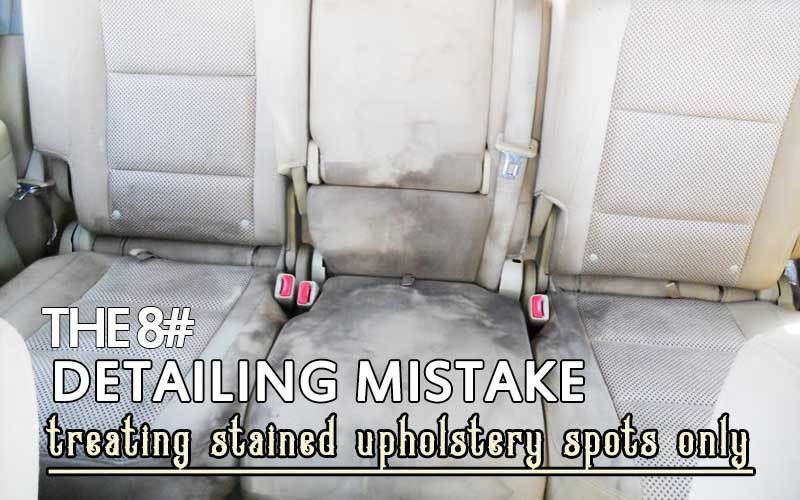
Treating Stained Upholstery Spots Only
That would look awkward, isn’t that? Make sure you’re giving focus to other parts too and evenly cleaning them. Using a dedicated upholstery cleaner evenly will do the trick.
9. Using Polishes On Headlights
This one might not be discussed often, but it’s a mistake people often do, even unconsciously. Unless you are working on headlight restoration, polishing them will yield a negative impact.
Usually, the headlights come with UV coating from the factory. They provide bright and crisp lighting. However, using polishes make the UV coating decay faster than it should. As a result, the lights turn cloudy and dull.
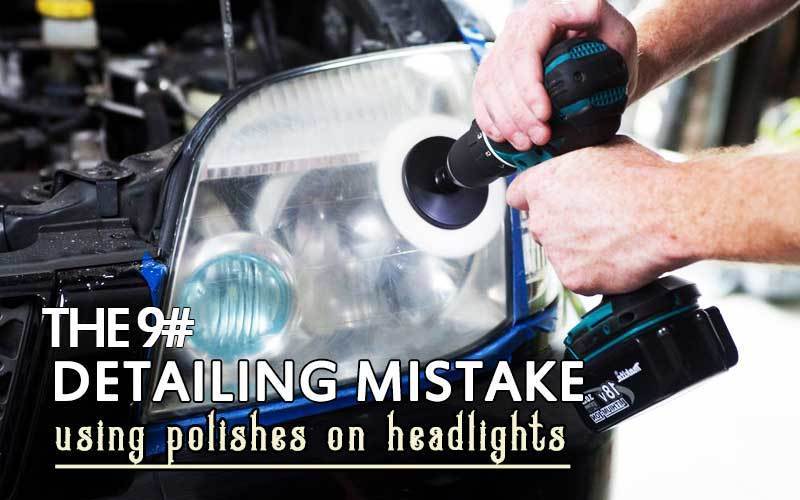
Using Polishes On Headlights
Make sure you’re not using polish or abrasives on them. If you must clean them, use waxes, sealants, or ceramic coatings. They actually improve the UV coating and help it last longer.
10. Using APCs Improperly
All-purpose cleaners can be a great alternative to buying your different cleaners for different parts of your car. But they come with some drawbacks, which you should be aware of.
Many beginners spray a large amount on the same spot, probably because they want to clean it better. Instead of cleaning, the solution turns into a stain.
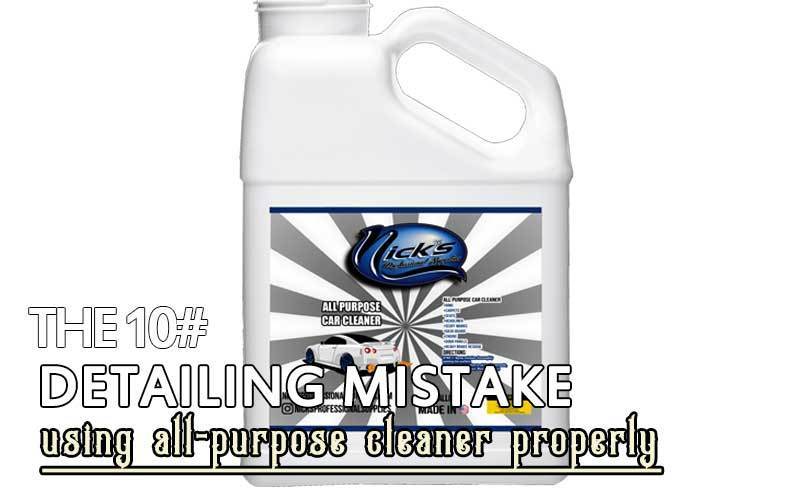
Using APCs Improperly
Also, stepping with wet shoes on an APC treated carpet will reactivate the solution. This will start working on your shoes and depositing dirt back into the floor mat.
To avoid them, make sure to spray evenly so that it doesn’t turn into a spot. And make sure you’ve given the solution adequate time to dry.
11. Using Clay Bars Inappropriately
First of all, the job of a clay bar is to remove dirt particles, tree saps, bird droppings that have been settled on your paint. Contrary to popular belief, it doesn’t remove scratches.
Secondly, using a clay bar way too often is harmful. Clay is an abrasive agent. Using it frequently will increase the risk of scratches on your car.
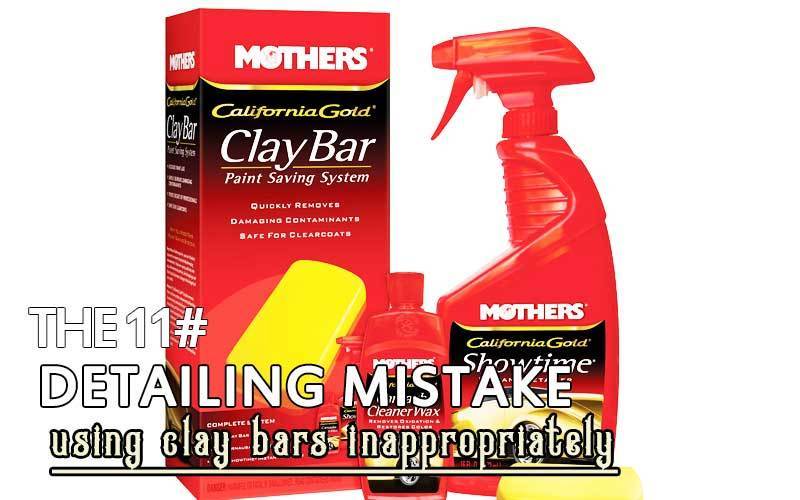
Using Clay Bars Inappropriately
Finally, use lubrication with your clay bar. Clays are meant to glide over the car surface. If you don’t use clay lubricants, you are risking scratches.
Also, never use an old, used clay bar, because it’s already contaminated. If the bar you bought is over 100 grams, you can cut it in half and save one for later use.
12. Using Chemicals In A Wrong Way
Chemicals can be your friend, as long as you use them properly. Many people rush while using them as if they have a train to catch. Not giving ‘dwell time’ to chemicals may lead to unsatisfactory results.
Let me explain. Usually, chemicals work by initiating a chemical reaction with the surface, not physical. For example, the components of soap bonds with oil in order to remove them. And in order to achieve results, you need to give the chemical time to work.
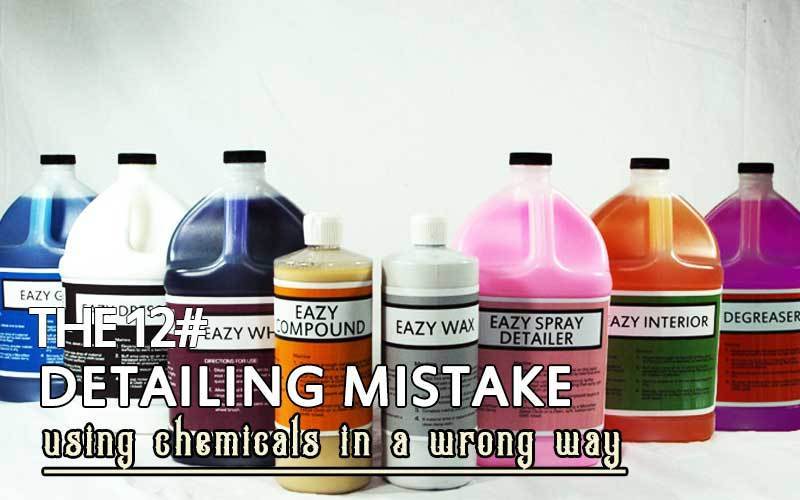
Using Chemicals In A Wrong Way
How will you know how much time it needs? Well, often that information comes with the manual. If not so, you can always call the customer service. Give the solution adequate time, so that you don’t have to reapply it, wasting time and money.
13. Aggressive Polishing
There are light polishes and there are aggressive polishes. Both are made for different levels of polishing. Failing to judge the polishing level you need might cost you hundreds of dollars in repainting.
Many traditional manufacturers use old compounds on their polish. These compounds contain strong formulas that might be too strong for modern paintwork.
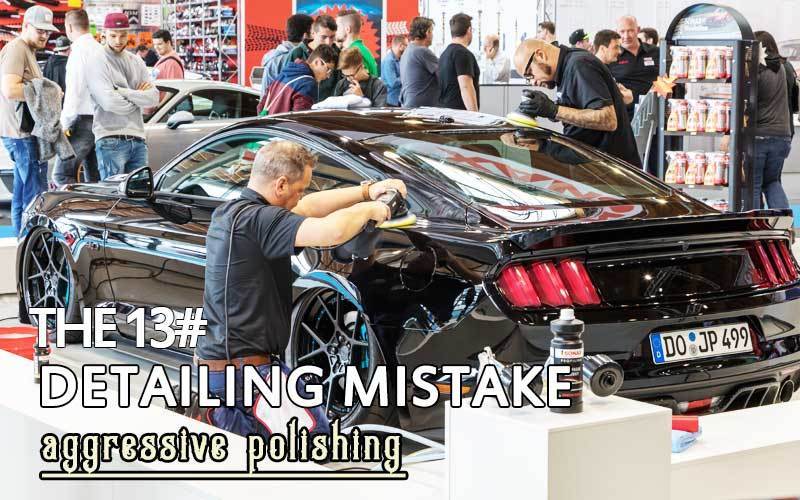
Aggressive Polishing
So stay on the safe side, start with lighter car polish. See how it works on your scratches. The polish should be enough for most of them. If it doesn’t remove everything you want to be removed, then move onto something stronger.
14. Lack of Body Protection
We are not speaking about your car here. We are speaking about you. While washing your car might be just a chore, you need to do better than wearing regular clothes.
Car detailing involves you exposing yourself to different chemicals. You might have a skin allergy, rashes, and irritations if you come in touch with them.
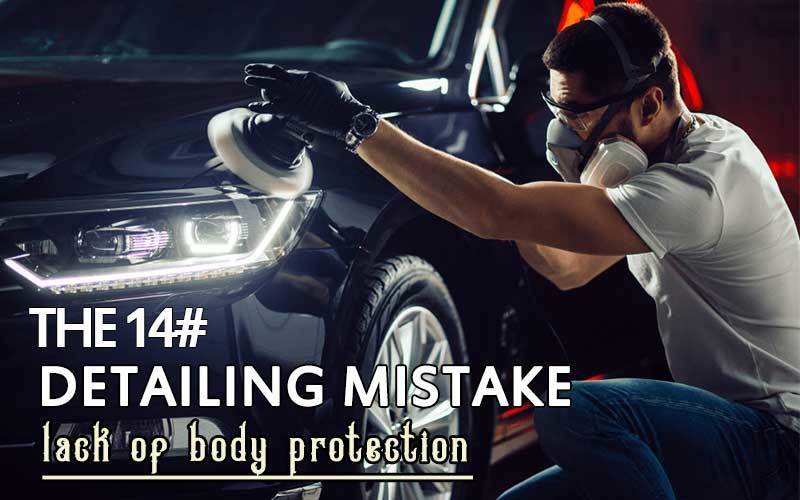
Lack of Body Protection
Start with preparing yourself first before preparing the car. Wear protective goggles, an apron, disposable hand gloves, and proper footwear. Wash your bare skin with clean water after the detailing process.
15. Being Impatient
The last one doesn’t have anything to do with the car, polish, or protective clothing. Rather it has everything to do with your mind.
Sometimes it might seem all easy in articles or on the internet. But trust me, you’ll many issues that require profound thinking, not hasty ones.

Being Impatient
Maybe your car shampoo won’t remove all the stains. But if you start rubbing the sponge harder on the spot, the paint will get damaged.
The cleaner might not clean the spot at once. But applying it for too long on a fixed spot will likely get you a stain.
You need to stay patient and realistic here. Remember, there is usually a proper chemical for every job. You just need to find it.
Final Words
So, you’ve educated yourself you detailing. At least, on the paper. That’s surely a reason to be confident, but save yourself from overconfidence.
You need to be careful when dealing with your car, chemicals, and polishers. All of this might seem easy on written words, but you have to face new challenges when you get to work. Anything goes wrong due to a rushed decision, and the money’s yours to lose.
We don’t want that. We want to help you. While we can’t steer away from every mistake that you might make, we can certainly give you a head start.
That’s why we discussed the top 15 mistakes made by beginner detailers. Hopefully, from now on, you’ll enjoy car detailing instead of thinking it as a burden.

